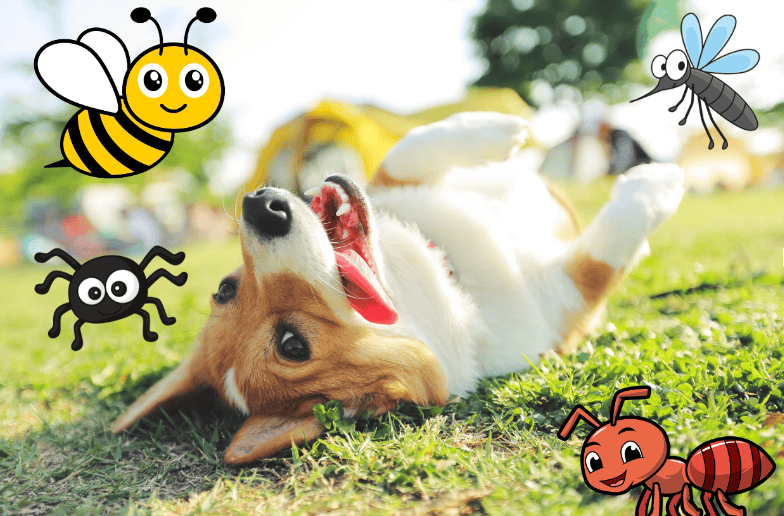Dog Insect Bites: How to Take the Sting Out for Lowcountry Pets
Living in the Lowcountry means lots of sunshine, salty breezes, and… biting bugs. While we humans can swat or spray them away, our dogs are much more vulnerable to insect bites—from mosquitoes and ants to bees and wasps.
At Mount Pleasant Animal Hospital, we treat a noticeable uptick in itchy, irritated pups during the warmer months. Whether your dog is lounging in the backyard or walking through a local park, it’s important to know how to spot insect bites, treat them quickly, and prevent future stings.
Dog Insect Bites: Why the Lowcountry is a Hotspot for Insects
Hot, humid, and buzzing with life—that’s summer in South Carolina. Unfortunately, it’s also the peak season for insect activity.
Here’s why our local environment raises the risk for dog insect bites:
-
- Mosquitoes thrive in marshy areas and love to bite exposed skin—ears, bellies, and noses are prime targets. These pesky insects are more dangerous than they look. Just one mosquito bite can transmit heartworm larvae into the bloodstream of your dog. Learn more on how to prevent heartworm here!
- Fire ants build mounds in grass and bite aggressively when disturbed, often targeting paws and legs. Summer rainfall pushes them to relocate to new areas to avoid flooding, which puts them in your dogs’ path frequently.
- Bees and wasps (ground hornets) can sting dogs sniffing near nests or flowers. Bees and wasps are in active home-making mode in the summer months, causing them to be more protective.
- Fleas thrive in our sandy soil, and the warm weather allows their life cycle to speed up. This allows for more fleas to irritate our pets and bring skin issues and other parasites.
- Ticks (actually an arachnid species) are usually more active in warm months, especially in wooded or grassy areas. And they transmit many life-threatening diseases.
- Spiders (also arachnids) such as the brown recluse or black widow pose threats to pets in the lowcountry. They may be small, but they pack a high volume of venom that can cause pain and tissue damage for your pet.
Short-haired dogs or those who spend lots of time outdoors are especially vulnerable, and allergic reactions can make even small bites a big problem.
Dog Insect Bites: What are the Signs & When to Be Concerned
Most insect bites on dogs are mild and resolve on their own—but others may require attention. Keep an eye out for:
- Persistent itching or scratching
- Swelling or red bumps, especially on the face, legs, or belly
- Licking or chewing at the bite site, resulting in hair loss
- Limping or paw sensitivity (common after fire ant bites and wasp stings)
- Hives or rash-like patches
- Sudden swelling around the face or eyes
- Trouble breathing (a sign of a severe allergic reaction)
If you notice any of the last three symptoms, call us immediately—these may signal an emergency allergic response.
Dog Insect Bites: Quick Relief Tips
If your dog gets a bite or sting, here are some things you can do right away:
- Remove the stinger (if present) by gently scraping with a credit card—not tweezers, which can squeeze more venom into the skin.
- Clean the area with mild soap and water to prevent infection.
- Apply a cold compress to reduce swelling and soothe irritation.
- Prevent licking or scratching using an e-collar or bootie if needed.
- Use an approved anti-itch spray (ask us before applying anything medicated).
Do not give your dog human medications unless directed by a veterinarian. Many OTC treatments for people are toxic to pets. If you have any questions or concerns about at-home treatment, give us a call!
To learn more about those outdoor insect dangers, watch this short video!
Dog Insect Bites: How to Prevent Insect Bites
Prevention is the best protection. Here’s how to lower your dog’s risk of getting bug-bitten:
- Avoid high-risk areas like tall grass, fire ant mounds, or flower beds during peak insect hours (dawn and dusk).
- Keep your lawn trimmed and treat your yard for fleas and mosquitoes.
- Apply a vet-approved flea and tick preventative year-round.
- Use pet-safe insect repellents—never DEET, which is toxic to dogs.
- Inspect your dog’s skin regularly for bites, bumps, or stingers.
Heading out for a hike or beach day? Ask us what bug protection is best for your dog’s lifestyle and coat type.
Dog Insect Bites: Treatment & How We Can Help
At Mount Pleasant Animal Hospital, we’re here to make your dog comfortable and bite-free. If your pet gets stung or bitten, we may recommend:
- Antihistamines or anti-inflammatory medication to reduce allergic responses
- Topical treatments to relieve itching and promote healing
- Antibiotics if the bite becomes infected
- Steroid injections in cases of severe swelling or hives
- Allergy testing or management if bites seem to trigger exaggerated responses
Our goal is fast relief and lasting comfort for your dog—and peace of mind for you.
Dog Insect Bites: Local Help for a Common Problem
Dog insect bites are a nuisance, but they don’t have to ruin your summer. Whether you need help with prevention, treatment, or allergy management, Mount Pleasant Animal Hospital has your back (and your dog’s belly, ears, and paws too).
We’re local, we’re experienced, and we understand the challenges of Lowcountry pet parenting.
Think your dog may have been bitten or stung? Give us a call at (843) 884-4921 or request an appointment online.
Mount Pleasant Animal Hospital is proud to be part of Animal Hospitals of the Lowcountry, a family-owned network of veterinary practices that includes:
- Mount Pleasant Animal Hospital – South Mount Pleasant SC, At Coleman Blvd and Old Village
- Shuler Veterinary Clinic – Central Mount Pleasant SC, At Town Center
- Safe Harbor Animal Hospital – North Mount Pleasant SC, At North MP and Hwy 41








